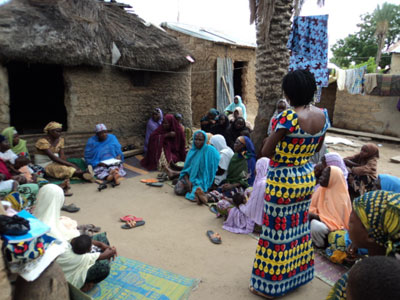Breastfeeding promotion messages integrated into microcredit sessions encourage Nigerian women to breastfeed longer
May 13, 2014
Exclusive breastfeeding for the first six months of life is recommended by international agencies as a way to limit childhood illness and early death. Now UNC researchers have found that a program integrating microcredit, cellphone messaging and breastfeeding promotion can increase the number of women who exclusively breastfeed their infants.
Led by Valerie L. Flax, PhD, research assistant professor of nutrition in the UNC Gillings School of Global Public Health, the study involved women from communities in the Bauchi State in northern Nigeria. The Journal of Nutrition [pdf] published the research online May 8.
The study reached out to women attending meetings about microcredit, a system through which small business owners, often women, receive loans to begin or advance their enterprise. Small groups of five to seven friends, neighbors and/or relatives join the microcredit program together and meet regularly with several other small groups to repay their microloans.
Every month during the study period, credit officers also led discussions about breastfeeding. Sessions covered recommendations for early and exclusive breastfeeding, benefits of following breastfeeding recommendations, breastfeeding techniques and timing for introducing complementary foods.

A credit officer leads a discussion on breastfeeding during a monthly microcredit meeting in Bauchi State, Nigeria.
Key messages from the meetings were sent as text and voice messages to phones that were given to small-group leaders, who were instructed to share the messages. Group members selected some messages to be dramatized or turned into songs and performed at monthly microcredit meetings.
The intervention was found to increase the likelihood that women in the groups exclusively breastfed for six months and changed breastfeeding habits in the first days of the babies’ lives. Women who took part were less likely to give their babies water instead of breast milk.
About 400 women participated in the study.
The study demonstrates that breastfeeding promotion integrated into a microcredit program can modify breastfeeding practices. The researchers believe that similar programs could be performed with success in other parts of Nigeria, where microcredit programs are common.
The intervention also could be adopted in other parts of the world, given that more than 150 million women, many of childbearing age, are involved in microfinance globally. This type of intervention has the potential to have a large impact in rural areas where other forms of breastfeeding support may be quite limited.
Joining Flax in the study were Sheila Leatherman, MSW, research professor of health policy and management, Margaret E. Bentley, PhD, Carla Smith Chamblee Distinguished Professor of nutrition, and Eric J. Daza, MPS, doctoral student in biostatistics, all from the Gillings School. Bentley and Daza also are affiliated with UNC’s Carolina Population Center – as faculty fellow and graduate research assistant, respectively.
The study intervention was implemented by Partners for Development, a U.S.-based nongovernmental organization that carries out microcredit and community development programs worldwide.

